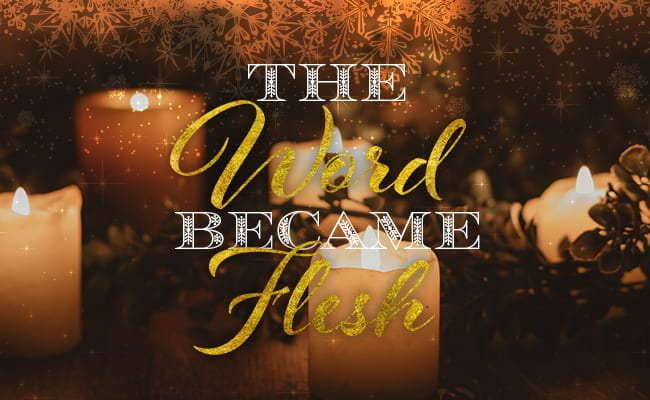I love Advent because the Advent season is a season of hope. No, not the hope that children (and even some adults) have to receive that special gift they so desire. Nor the hope that some hold onto wishing for large family gatherings or the end of an ongoing pandemic. No, the Advent season is uniquely about Hope entering a hopeless world. A world that had no hope because it was darkened by sin and rebellion. This world was our world and it was desperate because it was characterized by hatred, injustice, racism, immorality, violence, and selfishness.
To respond to this world that no had no hope, God mercifully had a solution. And, His solution might just be the most hope-filled message in all of Scripture.
“the Word became flesh and dwelt among us.” John 1:14
These words brim with hope because in them are the kept promises of past prophecies fulfilled in Christ’s first advent. In them, we also find hope that is a guarantee of His second advent. But the greatest hope found in these words is within the deep Christian and Christmas message that just might be the most profound statement in any literature in any language. Here’s why…
The Word was God.
Earlier in John’s gospel, these hope-filled words transport us to a time before Creation (John 1:1) where John asserts that the Word was with God. One way to understand the phrase is that this Word was “face to face with God.” It’s a Hebraic statement that describes the intimacy enjoyed between two people. In this case, between God and the Word. The Word that John is talking about is also God yet distinguishable from God.
We know from Christian teaching that this is a reference to the second person of the Trinity, God, the Son. The Word who became flesh and who would dwell among us was God Himself in the Person, Jesus Christ. Don’t miss the importance of this statement. That God did not send a substitute to become flesh but deliberately sent a Person in the Godhead, His Son, compels every person in this world to think of this Word in relation to eternity: He was in the beginning with God because He too, was God.
The Word who was God became flesh.
Jesus willingly entered this world. The Old Testament prophets told us that Jesus would be called “Immanuel,” for He was in the fullest sense “God with us.” When Jesus became flesh, the invisible God was made visible. The Puritan commentator, Matthew Henry wrote,
“By the light of nature, we see God as a God above us; by the light of the law, we see God as a God against us; but by the light of the gospel, we see Him as Immanuel, God with us, in our nature, and in our interest.”
In becoming flesh, the Word was frail, weak, dependent on God, and exposed to all that we as humans are exposed to. The Word became tired. The Word thirsted. The Word suffered. The Word was rejected. The Word endured injustice. The Word battled racism. The Word was hated. The Word felt the violence of others. The Word experienced the pain of loss when His friend, Lazarus died. The Word was betrayed.
And still, the Word became flesh.
The implication of this truth is simply overwhelming. When Jesus Christ became flesh, the God-man came together in both person and work. In His person, Jesus is God in the flesh. In His work on the cross, Jesus brings hope, the reconciliation of God and man through His atoning death. The Word became flesh for the sole purpose of the God-man dying for mankind.
The God that became flesh dwelt among us.
This is the most scandalous chapter in the Advent story. The Word lived among us.
Among us…we are those who lived in the world that had no hope because it was darkened by sin and rebellion. We are those who lived in the world that was desperate because it was characterized by hatred, injustice, racism, immorality, violence, and selfishness. Jesus, the God-man, chose neighbors who needed hope. The Word’s mission and purpose were entirely about bringing hope to those who had no hope…us.
I believe what John desires for us to grasp is that the hope Jesus brings is perfectly accomplished in the mystery of His identity as God and His experience as a man. To think that His heavenly throne was exchanged for a lowly manger. That this manger was then exchanged for an experience in a broken and needy world. And finally, that His earthly experience was willingly exchanged for an altar that would require His life to be given as a payment to His Father for our sinfulness. And because the Word dwelt among us, our identity as neighbors in need of hope is changed. We are now children of God, not born of blood, but of God (1:13).
This is the scandal of Advent.
Friends, this Advent, remember the highest hope for this world is not an institution or an educational organization. It is a Person – it is Jesus. And because of that reality, each one of us can confidently enter a hopeless world with Hope.
As 2021 concludes, we thank you for joining us in another year of meaningful work. In the year to come, our prayer is for each of you to bring hope to a world that needs Jesus today as much as it did two millennia ago.
On behalf of Jon Eckert, Erik Ellefsen, Stacey Lumley, and myself…Merry Christmas.
Matt Thomas
